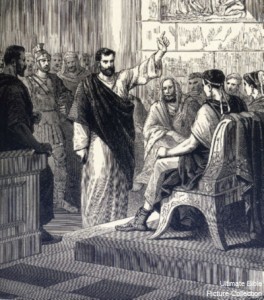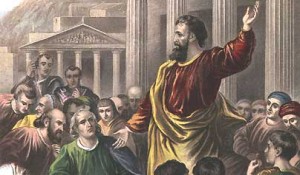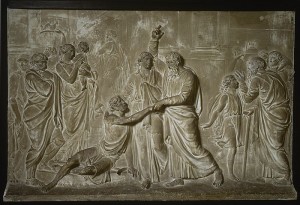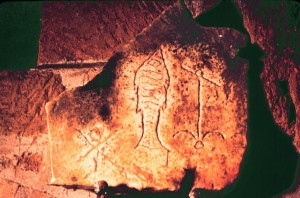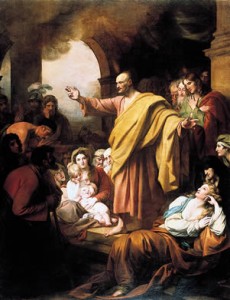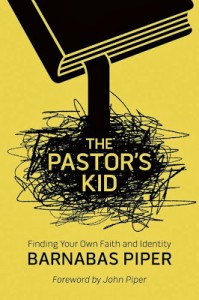23 When they were released, they went to their friends and reported what the chief priests and the elders had said to them. 24 And when they heard it, they lifted their voices together to God and said, “Sovereign Lord, who made the heaven and the earth and the sea and everything in them, 25 who through the mouth of our father David, your servant, said by the Holy Spirit, “‘Why did the Gentiles rage, and the peoples plot in vain? 26 The kings of the earth set themselves, and the rulers were gathered together, against the Lord and against his Anointed’— 27 for truly in this city there were gathered together against your holy servant Jesus, whom you anointed, both Herod and Pontius Pilate, along with the Gentiles and the peoples of Israel, 28 to do whatever your hand and your plan had predestined to take place. 29 And now, Lord, look upon their threats and grant to your servants to continue to speak your word with all boldness, 30 while you stretch out your hand to heal, and signs and wonders are performed through the name of your holy servant Jesus.” 31 And when they had prayed, the place in which they were gathered together was shaken, and they were all filled with the Holy Spirit and continued to speak the word of God with boldness. 32 Now the full number of those who believed were of one heart and soul, and no one said that any of the things that belonged to him was his own, but they had everything in common. 33 And with great power the apostles were giving their testimony to the resurrection of the Lord Jesus, and great grace was upon them all. 34 There was not a needy person among them, for as many as were owners of lands or houses sold them and brought the proceeds of what was sold 35 and laid it at the apostles’ feet, and it was distributed to each as any had need. 36 Thus Joseph, who was also called by the apostles Barnabas (which means son of encouragement), a Levite, a native of Cyprus, 37 sold a field that belonged to him and brought the money and laid it at the apostles’ feet.
In William Faulkner’s Sanctuary, a character identified only as “the stranger” is speaking to a young woman and says this:
“You see,” he said, “I lack courage: that was left out of me. The machinery is all here, but it won’t run.”[1]
That is an interesting confession. It would be hard to admit that you do not have courage, but, in truth, how many of us would have to admit precisely that? Many of us do not know if we have courage or not because we have never truly been in situations where courage was required. But time and again human beings show that “the machinery is all there, but it won’t run.”
I am thinking here of pedestrians who stand idly by while a man beats a woman to death on the street in broad daylight. I am thinking here of church officials who stand idly by while predator priests pray on children. I am thinking here of young people in schools who let bullied kids continue to get bullied instead of getting involved. The examples go on and on.
Yes, perhaps there is at least anecdotal evidence to suggest that we human beings are not as courageous as we like to think. There are acts of amazing heroism, to be sure, but does it not sometimes seem as if these acts pale in comparison to acts of cowardice.
Courage.
Among the Christian virtues we tend to stress, courage is usually absent. Why? Because we have not grown up in a persecuted context. We have not had to exercise courage. Even so, as the culture is increasingly secularized, it will take more and more courage to follow Jesus. We will increasingly have to decide (a) whether we are willing to suffer for our King and (b) what we will do when we do suffer for our King.
The second half of Acts 4 is interesting in that it shows us what the early band of Christians decided to do in the face of persecution. Their response is illuminating. It reveals amazing faith and amazing resolve and amazing courage.
In our text, Peter and John are released and return to the gathered believers to report what has happened. The Sanhedrin, after warning them to stop preaching about Jesus, let them go. F.F. Bruce has relayed some fascinating words from a modern Jewish historian about the misstep that the Jewish Sanhedrin took in their handling of Peter’s preaching.
This was the first mistake which the Jewish leaders made with regard to the new sect. And this mistake was fatal. There was probably no need to arrest the Nazarenes, thus calling attention to them and making them ‘martyrs.’ But once arrested, they should not have been freed so quickly. The arrest and release increased the number of believers; for these events showed on the one hand that the new sect was a power which the authorities feared enough to persecute, and on the other hand they proved that there was no danger in being a disciple of Jesus (he, of course, being the one who had saved them from the hand of their persecutors!).[2]
This is an interesting assessment of the Sanhedrin’s handling of the case. Regardless, they did let Peter and John go. We are then able to see what they and the gathered Church did in response to this persecution.
The Persecuted Church Demonstrated Radical Dependence on God Through Impassioned Prayer
Most notably in our text is the immediate response of prayer.
23 When they were released, they went to their friends and reported what the chief priests and the elders had said to them. 24a And when they heard it, they lifted their voices together to God and said,
At the risk of causing offense, allow me to say that what these early believers most decidedly did not do was call their senator and complain! I, of course, realize that there were no Christian senators to call, but I believe the principle stands. There is nothing in the disposition of the gathered church upon hearing of this persecution that evidences a desire on their part to trust in the strength of man. On the contrary, they fled to God!
Prayer was anything but theoretical or merely spiritual to the Church. It was life! They cried out to the only One who could save them: the Lord God. The Reformation era commentator, Rudolph Gwalther, has commented poignantly on this reality.
[Luke] tells of how the church sought the support and help of God only by prayer. They were not careless, nor did they make light of the dangers approaching. They did not flee to human wisdom, help or counsel but sought all manner of aid and support by prayers. This is the sure sanctuary of the church, because God promises everywhere to be the defender of those who seek help from him.[3]
Yes, prayer is “the sure sanctuary of the church.” People flee to the Church for protection, but where does the Church flee? To God. They depended upon the strength and faithfulness of God, as the beginning words of their prayer made clear.
24b “Sovereign Lord, who made the heaven and the earth and the sea and everything in them,
They refer to God as “Sovereign Lord,” using the Greek word despotas, from which we get the word despot. Interestingly, this title is used around twenty-five times in the Old Testament. It is used only three times to refer to God the Father in the New Testament and three times to refer to Jesus. Some suggest that the infrequent usage of this title in the New Testament might be evidence that, by the time of the first century, the word was taking on more of a negative connotation, much like the word despot carries today. Even so, the fact that this title is used here is significant. In a time of trouble they speak of God in terms of power and might and rule. A people being persecuted by the authorities are proclaiming aloud that there is yet a higher authority than earthly rulers.
25 who through the mouth of our father David, your servant, said by the Holy Spirit, “‘Why did the Gentiles rage, and the peoples plot in vain? 26 The kings of the earth set themselves, and the rulers were gathered together, against the Lord and against his Anointed’—
The early church, in their prayer, saw the persecution of the believers as a fulfillment of Psalm 2, which they here reference. It is worth our while to consider this Psalm in its entirety.
1 Why do the nations rage and the peoples plot in vain?
2 The kings of the earth set themselves, and the rulers take counsel together, against the Lord and against his Anointed, saying,
3 “Let us burst their bonds apart and cast away their cords from us.”
4 He who sits in the heavens laughs; the Lord holds them in derision.
5 Then he will speak to them in his wrath, and terrify them in his fury, saying,
6 “As for me, I have set my King on Zion, my holy hill.”
7 I will tell of the decree: The Lord said to me, “You are my Son; today I have begotten you.
8 Ask of me, and I will make the nations your heritage, and the ends of the earth your possession.
9 You shall break them with a rod of iron and dash them in pieces like a potter’s vessel.”
10 Now therefore, O kings, be wise; be warned, O rulers of the earth.
11 Serve the Lord with fear, and rejoice with trembling.
12 Kiss the Son, lest he be angry, and you perish in the way, for his wrath is quickly kindled. Blessed are all who take refuge in him.
Originally, “his Anointed” was understood to refer to David. The early Church saw David as a type and interpreted to be also a reference to the Messiah, Jesus. What is telling is that in this particular prayer, the gathered Church appeals to the Psalm in the context of earthly kings and rulers persecuting them. That is most fascinating! The same body who saw this as a reference to nations raging against Christ also saw this as a reference to the nations raging against the Church. This was only natural, for they understood themselves to be the body of Christ. To rage against the Church is to rage against Christ! They did not, of course, view the Church to be Christ, but they did see the union of Christ and His bride to be of such a quality that you could not strike against one without striking out against the other.
27 for truly in this city there were gathered together against your holy servant Jesus, whom you anointed, both Herod and Pontius Pilate, along with the Gentiles and the peoples of Israel, 28 to do whatever your hand and your plan had predestined to take place. 29 And now, Lord, look upon their threats and grant to your servants to continue to speak your word with all boldness, 30 while you stretch out your hand to heal, and signs and wonders are performed through the name of your holy servant Jesus.”
Do you see? They raged against Christ and now they rage against His Church. But do they ask to be removed from this tribulation? No! They ask instead, that God would grant them “to continue to speak your word with all boldness”! Unbelievable! They pray for courage and strength and boldness!
Would that we were possessed of such wondrous resolve and determination! Would that we ceased our complaining and prayed for greater boldness instead! Would that the Church today had the same sense of mission as the Church then!
Heaven’s response to this prayer is telling.
31 And when they had prayed, the place in which they were gathered together was shaken, and they were all filled with the Holy Spirit and continued to speak the word of God with boldness.
Ah! Divine power shakes the place where they are and they filled with the Spirit of the living God. And, once again, this filling resulted in impassioned emboldened proclamation of the gospel!
Do not forget the power of prayer. Do not forget that our ultimate victory lies not in earthly conquest but in divine empowerment to speak the truth boldly and in love.
The Persecuted Church Clung to Christ and to One Another and Grew
In addition to greater boldness, the Church’s impassioned plea for divine help enables them to continue in their life together. The verses that follow are very similar to those of Acts 2:42-47.
32 Now the full number of those who believed were of one heart and soul, and no one said that any of the things that belonged to him was his own, but they had everything in common. 33 And with great power the apostles were giving their testimony to the resurrection of the Lord Jesus, and great grace was upon them all. 34 There was not a needy person among them, for as many as were owners of lands or houses sold them and brought the proceeds of what was sold 35 and laid it at the apostles’ feet, and it was distributed to each as any had need. 36 Thus Joseph, who was also called by the apostles Barnabas (which means son of encouragement), a Levite, a native of Cyprus, 37 sold a field that belonged to him and brought the money and laid it at the apostles’ feet.
It is right that these verses should be so similar to those of Acts 2, for the Church is continuing in the same power of the same Spirit that moved in and among them at Pentecost. Their lives together are marked by radical unity and radical love and radical generosity.
We see, for instance, another reference to the fact that the early Church gave of their possessions in order to care for those in need. Ben Witherington writes of the phrase “sold them” (v.34), “the use of the iterative imperfect verbs (“they used to sell…,” etc.) suggests historical distance from a practice that was repeated or ongoing for a period of time.” Interestingly, he also suggests that this description of life in the early church may have had an apologetic purpose for Theophilus, the one for whom this account was written.
…but he also uses language that a Theophilus would recognize as reflecting the Greek ideals about how true friends should act. Aristotle said that true friends held everything I common…and were of one mind…much the same as is said here. What is interesting about the Christian use of such conventions is that while friendship in the Greco-Roman mold often involved reciprocity between those who were basically social equals, what Luke seems to be inculcating here is conventions whereby Christians with goods will provide funds to the community for those who are needy without thought of return, and thus he is suggesting something more akin to family duties.[4]
There can be no doubt that there is an apologetic reality to this description. Only a risen and living Savior could take a people and make them into this kind of family. Only a risen and living Savior could bind a people together in such unity, in such singularity of purpose, in such stalwart resolve, in such unabated courage, and in such a radical demonstration of agape love.
The way the Church does life together speaks powerfully to the watching world of who God is. Will Willimon observed astutely when he wrote:
When you think about it, the quality of the church’s life together is evidence for the truthfulness of the resurrection. The most eloquent testimony to the reality of the resurrection is not an empty tomb or a well-orchestrated pageant on Easter Sunday but rather a group of people whose life together is so radically different, so completely changed form the way the world builds a community, that there can be no explanation other than that something decisive has happened in history. The tough task of interpreting the reality of a truth like the resurrection is not so much the scientific or historical, “How could a thing like that happen?” but the ecclesiastical. “Why don’t you people look more resurrected?”[5]
Behold the praying, loving, trusting, proclaiming people of God!
May we become such a people!
[1] William Faulkner. Sanctuary. (New York: Vintage Books, 1993), p.17.
[2] Bruce, F.F. (1988-06-30). The Book of Acts (New International Commentary on the New Testament) (p. 97). Eerdmans Publishing Co – A. Kindle Edition.
[3] Esther Chung-Kim and Todd R. Hains, eds. Acts. Reformation Commentary on Scripture. New Testament, vol.VI. Timothy George, gen. ed. (Downers Grove, IL: InterVarsity Press, 2014), p.53-54.
[4] Ben Witherington III, The Acts of the Apostles: A Socio-Rhetorical Commentary. (Grand Rapids, MI: William B. Eerdmans Publishing Company, 1998), p.205.
[5] William H. Willimon, Acts. Interpretation. (Louisville, KY: John Knox Press, 1988), p.51-52.


